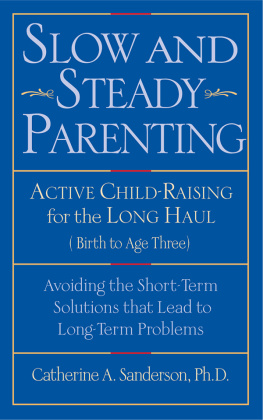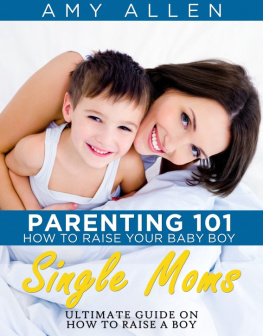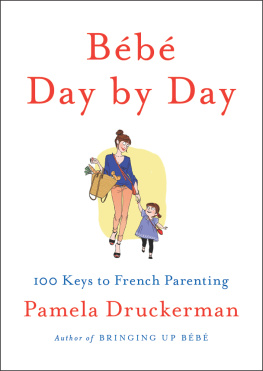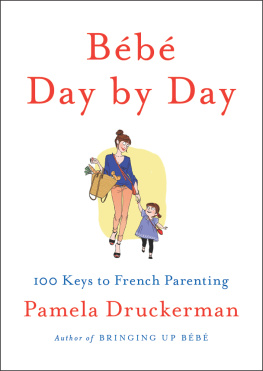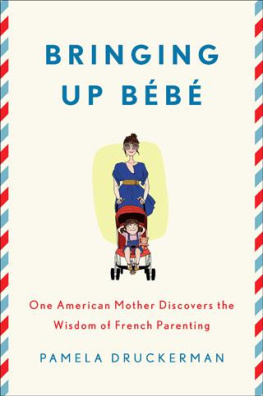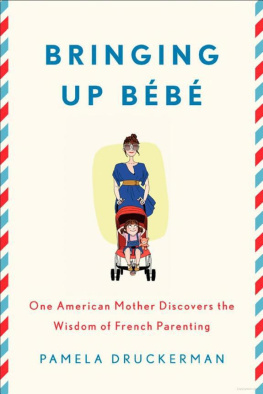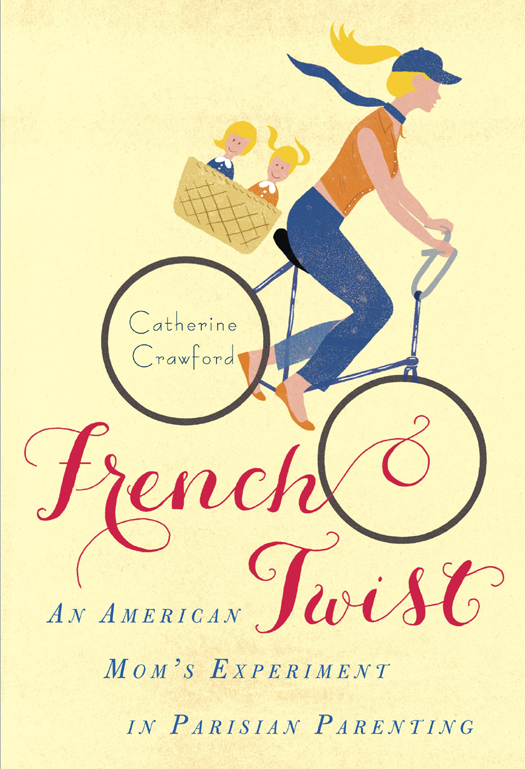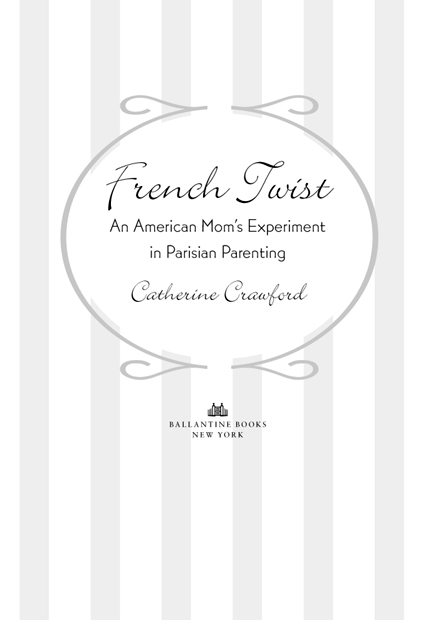This is a work of nonfiction.
Some names and identifying details have been changed.
A Ballantine Books eBook Edition
Copyright 2013 by Catherine Crawford
All rights reserved.
Published in the United States by Ballantine Books, an imprint of The Random House Publishing Group, a division of Random House, Inc., New York.
B ALLANTINE and colophon are registered trademarks of Random House, Inc.
Library of Congress Cataloging-in-Publication Data
Crawford, Catherine.
French twist: an American moms experiment in Parisian parenting/Catherine Crawford.
p. cm.
eISBN: 978-0-345-53598-6
1. ParentingFrance. 2. ParentingUnited States.
3. ParentingCross-cultural studies. I. Title.
HQ755.8C728 2012
306.874dc23 2012034020
www.ballantinebooks.com
Cover design: Thomas Beck Stvan
Cover illustration: Chris Silas Neal
v3.1
Oeuf means egg chapeau means hat. Its like those French have a different word for everything!
STEVE MARTIN
Contents
Chapter One
Voici la Situation or The Mess Were In
Chapter Two
Un Dbut Franais or French from the Start
Chapter Three
Vous tes le Chef or On Becoming the Chief
Chapter Four
Homme, Femme, Enfants or How Boundaries Saved My Sanity
Chapter Five
Le Repas de Famille or The Family Meal
Chapter Six
Les Plaisirs Simples or The Gift of Less
Chapter Seven
Les Petits Trsors or Teaching the Art of Living
Chapter Eight
La Conclusion
Chapter One
Voici la Situation or The Mess Were In
As a mother with two young daughters in a trendy urban neighborhood, hedged in by hordes of other trendy urban families, I often feel a keen sense of bafflement at what I see going on with the procreators in my midst. So, at the risk of being a traitor to my generation, I have to say: I dont know when or how it happened, but its clear to me that, even as we have tried harder than any of our ancestors to mentor, please, and encourage our kids, we have completely lost control of them, and in the process weve lost control of our own lives as well. And it isnt pretty. How ugly is it? Three words: baby yoga pants.
I live in Park Slope, Brooklyn, quite possibly the world headquarters of helicopter parents, but Ive seen similar abdication in Manhattan, San Francisco, Seattle, Los Angeles, and Portland, Oregon. These are just the cities I visit regularly; I have a pretty good hunch its happening in nearly every middle-class neighborhood nationwide, urban or otherwise. How can I be so sure? Here are a couple of the many ways: Id be willing to wager that you knowall too well?parents who live in fear of their toddler, or that youre aware that a Bugaboo is not merely a synonym for hobgoblin. I have absolute certainty that, thirty-some-odd years ago, my mother didnt pick me up from school laden with four snack choices to ensure my satisfaction (and avoid a meltdown) and that she didnt put in a lot of time worrying that she wasnt being the best mom she could possibly be.
But now these are the types of thoughts that pack the days of every parent I know. I count myself very much among them (sorry, Ma!). Im ready for change.
Although the familiar dictum children should be seen and not heard may be a bit harshand the truth is, I enjoy hearing my kids much of the timeIm afraid that the new trend of seeing, hearing, pondering, analyzing, cogitating, working through, and giving in to our children is no better. And it may even be worse: New research suggests that kids who are too often encouraged to share every last scrap of a thought, and then praised for whatever they share, tend to suffer later in life when teachers, bosses, and other mentor figures are less inclined to adore each effort.
I love my kids dearly, but sometimes I honestly dont give a crap about how they feel after a harmless skirmish on the playground or what their concerns are when they do something wrong and are punished. I yearn (but have yet) to steal the phrase my dad employed often during my own upbringing: I dont care what you think! Ill do the thinking for all of us!
About seven years ago, when I was new to the mothering game, Id watch parents in the same overwhelmed boat as me with the hope that Id learn secrets to child-rearing in this exciting, challenging, and liberated age. Ah, that mother is now massaging her son who threw sand in the eyes of a baby. Was he just too tense? Is that why he acted up? Note to self: Keep baby relaxed. In my neighborhood, I see a lot of talking it out. It is not uncommon to overhear parents encourage their children to express their feelings while, say, in restaurants.
Why do you want to jump on the table, Liam?
Coco, please try to explain your anger toward the green beans.
Theres a mindset in these parts that children should be treated like adults, with all of their tastes and distastes respected.
Having grown up with twelve siblings and roughly zero of my tastes and distastes even acknowledgedrespect was generally uttered only in the context of what the small residents of the house should have for the taller inhabitantsthis sounded sweet to me. Kids are people too, after allshort, often totally unreasonable people, but people nonetheless. In practice, however, this notion was a lot less quaint.
I remember my older daughter, Oona, two years old at the time, telling me that my words were hurting her. My grievous offense? Id asked her to bring me her shoes. I also remember thinking, a little to my horror, Oh, Ill show you something that hurts. Thankfully, I only laughed and walked out of the room, leaving her utterly outraged. But early on I had my doubts about this new sort of level playing field between parent and child. After all, until about seven or eight years of age (if you are lucky), kids are, by nature, irrational.
My suspicions were realized on an early fall evening when my French friend Lucie came to dinner with her husband and two children. The Durand kids were obedient, respectful, and, when told to be, quiet. They didnt seem to require cajoling or lengthy explanations when asked to set the table. They simply did what they were told. If they didnt want a certain dish at dinner, they didnt eat it, but they also were not offered a myriad of other choices. Not a single cheese stick was proffered.
After dinner, we parents were sitting around the dining room table, finishing a bottle of wine, while the kids played in the living room. A mom could get used to this, I thought, recliningreclining!in my chair. But the sweet, slightly inebriated reverie did not last long.
Soon enough, my younger daughter, Daphne, wanted my attention, so she did as she usually does: Namely, she started to act bananas, screaming and yelling for me. (This was back when Daph would dive to the ground at the slightest provocation in order to better express her tantrums, pounding and kicking the floor with such exuberance that we referred to this move as pulling a McEnroe; more on this later.)



